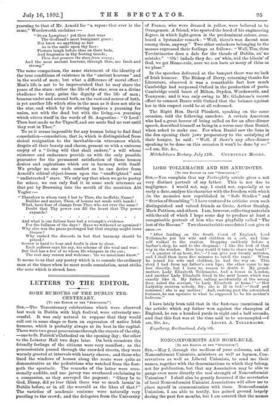LETTERS TO THE EDITOR.
SOME HUMOURS OF THE DUBLIN TER- CENTENARY.
[TO THE EDITOR OF THE " SPECTATOR."]
SIR,—The Tercentenary celebrations which were observed last week in Dublin with high festival, were extremely suc- cessful. It was only natural to suppose that they would -call out in some shape or form an expression of native Irish humour, which is probably always at its best in the capital. There were two great processions through the streets of the city, —one to St. Patrick's Cathedral on the opening day; the other to the Leinster Hall two days later. On both occasions the friendly feelings of the citizens were very manifest ; as the processionists passed through the crowded streets, they were warmly greeted at intervals with hearty cheers ; and those who lined the windows of houses along the route were quite as demonstrative as the pedestrians who watched from the foot- path the spectacle. The remarks of the latter were occa- sionally audible, and one jarvey was overheard exclaiming to a companion, as they surveyed the pageant : " Glory be to God, Dinny, did ye iver think there was so much larnin' in Dublin before, or in all the wurruld as the likes of that ?" The varieties of academic costume were naturally very puzzling to the crowd; and the delegates from the University
of France, who were dressed in yellow, were believed to be Orangemen. A friend, who sported the hood of his engineering degree, in which light-green is the predominant colour, over- heard a bystander remark : " Well, there's wan dacent man among them, anyway." Two other onlookers belonging to the masses expressed their feelings as follows : " Well, Tim, thim Tarcintinaries does a dale for the thrade of Dublin, an' no mistake." " Oh ! indade they do ; an' whin, wid the blissin' of God, we get Home-rule, sure we can have as many of thim as we place."
In the speeches delivered at the banquet there was no lack of Irish humour. The Bishop of Derry, returning thanks for Literature, observed it was a remarkable fact how much Cambridge had surpassed Oxford in the production of poets. Cambridge could boast of Milton, Dryden, Wordsworth, and Tennyson; and it was only owing to Mr. Gladstone's recent effort to connect Dante with Oxford that the balance against her in this respect could be at all redressed.
The Right Hon. David Plunkett, speaking on the same occasion, told the following anecdote. A certain American who had a great horror of being called on for an after-dinner speech, described himself as being in a worse case than Daniel, when asked to make one. For when Daniel saw the lions in the den opening their jaws preparatory to the satisfying of their hunger, he said : " Well, if there's any after-dinner speaking to be done on this occasion it won't be done by me." —I am, Sir, &c., Mitchelstown Rectory, July 11th. COURTENAY MOORE.


































 Previous page
Previous page